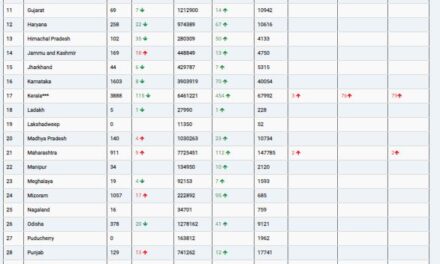New Delhi, July 26, 2024 – On the occasion of the launch of the “Economic Case for Investment in the Well-being of Adolescents in India” report, Union Health Secretary Shri Apurva Chandra reiterated India’s unwavering commitment to nurturing adolescent talent, supporting their ambitions, and empowering them to build a brighter and inclusive future. The report highlights significant improvements in adolescent well-being in India, showcasing the government’s extensive policies and programmes aimed at promoting the health and well-being of adolescents.
“India has and will continue to remain steadfast in its commitment to nurturing adolescents’ talents, supporting their ambitions and empowering them to build a brighter, inclusive future for all,” stated Shri Chandra. He emphasized that with the largest population of adolescents globally, numbering 253 million, India’s future lies in the hands of these young individuals who embody the promise of a vibrant and progressive nation.
Pioneering Adolescent Health Programs
Shri Chandra highlighted India’s pioneering efforts, including the Rashtriya Kishor Swasthya Karyakram (RKSK), the first of its kind dedicated program aiming to reach out to 253 million adolescents with a special focus on marginalized and under-served groups. The School Health and Wellness Programme under Ayushman Bharat aims to strengthen health promotion and disease prevention interventions for school children using trained teachers. Additionally, the Scheme for Promotion of Menstrual Hygiene focuses on increasing awareness and promoting menstrual hygiene practices among adolescent girls.
“By fostering partnerships with non-governmental organizations, community leaders, and international agencies, we aim to amplify our efforts and reach every adolescent, regardless of their socio-economic background,” Shri Chandra added.
Technological Advancements and Budgetary Allocations
The Union Health Secretary also announced the forthcoming launch of the U-WIN platform, modeled after the successful Co-WIN platform, which will revolutionize the storage and digitization of health records for every child, facilitating better monitoring and addressing challenges promptly.
Shri Anandrao V. Patil, Additional Secretary, Ministry of Education, highlighted the increased budgetary allocation for school education and the modifications being made to the school curriculum to enhance skills from the 6th grade onwards. Special efforts are being made towards girl education, children with special needs, and promoting menstrual hygiene in schools.
Global Recognition and Economic Implications
Commending the Government of India’s initiatives, Shri Rajat Khosla, Executive Director of PMNCH, noted that adolescents, constituting one-fifth of the global adolescent population, face numerous challenges such as violence and early pregnancies. He applauded the significant budgetary allocation of Rs. 2 lakh crore towards adolescent well-being in the Union Budget 2024-25, emphasizing the economic and social imperatives of investing in adolescents.
Dr. Rodrigo H. Ofrin, WHO Representative to India, highlighted India’s achievements in various health indicators and the convergence of government schemes ensuring adolescent well-being. He stressed that investing in adolescents is a smart investment in the nation’s future and essential for achieving the Sustainable Development Goals (SDGs).
Key Findings and Future Directions
Prof. Bruce Rasmussen from Victoria University presented key findings from the Investment Case for Adolescent Health & Wellbeing, outlining significant progress in domains such as agency and resilience, safety and supportive environment, health and nutrition, education, skills, employability, and societal contribution. He highlighted that increased government intervention in education, skill development, and reduction of child marriage and road accidents could significantly boost India’s GDP.
Dr. Yatan Pal Singh Balhara of AIIMS New Delhi noted a paradigm shift in India with a heightened focus on mental health in the recent Economic Survey. Dr. Reena Yadav of Lady Hardinge Medical College emphasized the need for education and awareness in adolescent upbringing, advocating for respect for their privacy in counseling on sexual and reproductive health issues.
Grassroots Insights and Commitment
Youth representative Ms. Priya Rathore from Rajasthan shared her experiences working with adolescent women facing challenges like child marriage and the need for increased monitoring and evaluation of government support at the grassroots level.
The “Economic Case for Investment in the Well-being of Adolescents in India” report underscores the substantial economic benefits of investing in adolescent well-being, projecting impressive returns on investment and significant contributions to the GDP. The newly released Union Budget 2024-25 includes a comprehensive Rs. 2 lakh crore package aimed at education, job creation, skill development, and employment-linked incentives, benefiting millions of youth across the nation.
As India continues to prioritize adolescent well-being, the government’s commitment to creating an enabling environment and providing necessary resources and opportunities is clear. This initiative not only aligns with national goals but also positions India as a beacon of hope and progress on the global stage.











